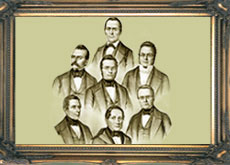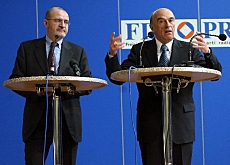Radicals face loss of voter confidence

The centre-right Radical Party is rallying its forces in a bid to halt a steady decline at the ballot box and amid a political scandal in a traditional stronghold.
Switzerland’s Grand Old Party, which is seen as close to the business community, might want to re-invent itself to attract an urban and modern electorate, an expert tells swissinfo.
The demotion of Marina Masoni, political shooting star from Lugano and finance director in canton Ticino, came as a blow both to the regional party chapter and to the national party.
Her fall from grace last month not only dented her chances of crowning her career at a federal level, it also risks driving a wedge into the entire Radical Party – not only in its regional stronghold in southern Switzerland.
It is the latest in a line of setbacks suffered by the Radicals over the past year, notably over the demise of Swissair, the country’s biggest corporate failure.
Several prominent businessmen and former Radical Party politicians who sat on the board of the national airline are facing legal action.
Recent cantonal and local elections in western Switzerland and Bern show the party struggling to stop the downward spiral at the polls. Two weeks ago the party lost two more seats to the centre-left in elections to cantonal governments.
The Radicals dropped back into fourth place after losing a record number of 89 seats in cantonal parliaments over the past 18 months according to official data.
Grassroot problems
But Werner Seitz, a political scientist at the Federal Statistics Office, says the decline began about 25 years ago.
“The Radicals have been losing support among voters ever since 1979. They now hold less than 20 per cent of seats in cantonal parliaments [from 28 per cent in 1979] and only took 17 per cent in the last general elections [in 2003] – down from 24 per cent,” he told swissinfo.
Seitz says the marked decrease is the result of the party leadership losing touch with its grassroots.
“The party elite pushed for Swiss membership of the European Union. It came out in favour of a liberal drugs policy and championed equal opportunities and environmental issues.”
However, citizens voted with their feet and the rightwing Swiss People’s Party was among the main beneficiaries.
Winning voters back
Seitz says the Radicals might be well-advised to go back to their roots. The party which founded modern-day Switzerland in the 19th century was also the group that promoted new railway lines and other infrastructure projects as well as social progress, including labour laws.
“The Radicals stand to attract more young and urban voters if the party re-invents itself as the force that pushes for progress and reform without leaning to the left,” he said.
Pandering to the right by trying to appeal to supporters of the People’s Party would not pay off for the Radicals, says Seitz.
Equally unpromising is a merger with the centre-right Christian Democratic Party, as has been mooted by some experts.
“It’s not a good idea to merge two parties on a losing streak,” Seitz said. “Historically they are also too different and they seem to be moving in opposite directions.”
The crisis in Ticino is likely to put an additional strain on the Radicals on a regional as well as a federal level.
“Masoni, a representative of the neo-liberal wing of her party, made tax reforms a priority. Her demotion is a personal defeat and a setback for the business-minded faction of the Radicals.”
National party delegates put on a brave face at a meeting earlier this month. They adopted a policy paper which calls for reforms in education ahead the 2007 parliamentary elections.
swissinfo, Urs Geiser and Olivier Pauchard
Seats in cabinet: 2
Seats in 246-member parliament: 50
Voters’ share (federal elections 2003): 17.3%
Seats in cantonal governments (April 2006): 41
Seats in cantonal parliaments: 547
The centre-right Radical Party is one of the four main parties represented in the government where it holds two seats.
Historically the Radicals emerged from the liberal movement at the beginning of the 19th century.
They founded the modern Swiss state in 1848 and played a dominant role until 1918. Today the Radicals are the third-largest party.
The recent decline of the party which is traditionally associated with the business community began about 25 years on a federal, cantonal and local level.

In compliance with the JTI standards
More: SWI swissinfo.ch certified by the Journalism Trust Initiative




You can find an overview of ongoing debates with our journalists here . Please join us!
If you want to start a conversation about a topic raised in this article or want to report factual errors, email us at english@swissinfo.ch.